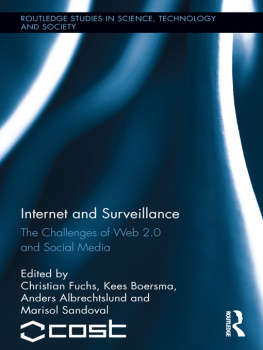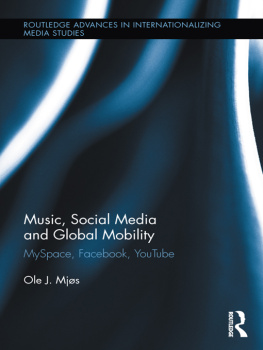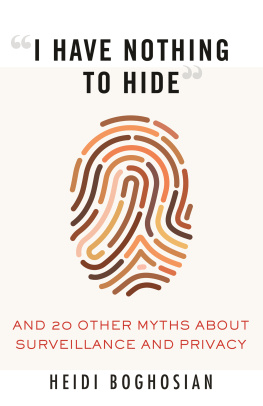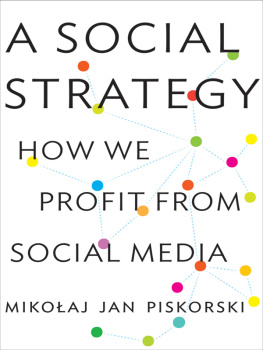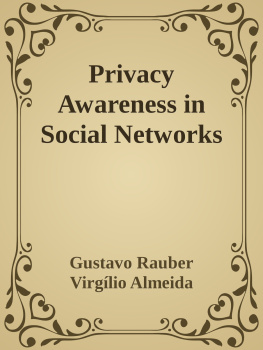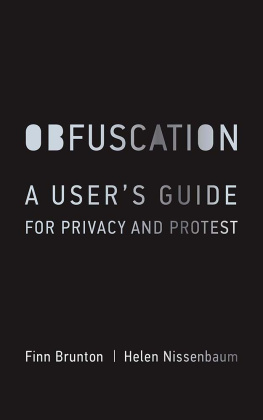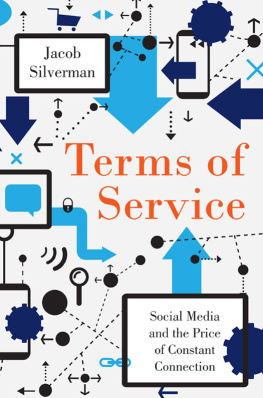Figures
Tables
| 1.1 |
| 1.2 |
| 2.1 |
| 2.2 |
| 6.1 |
| 7.1 |
| 7.2 |
| 14.1 |
Anders Albrechtslund holds a BA & MA in philosophy (University of Odense, Denmark, 2003) and a PhD in Information Studies (Aalborg University, Denmark, 2008). He has published work on surveillance, new technologies, social media, and ethics. Currently, he is an Assistant Professor at Aarhus Universitys Department of Information and Media Studies. His research interests include surveillance technologies in urban spaces and ways to conceptualize surveillance. He is a member of the Management Committee of the EU COST Action Living in Surveillance Societies (20092013). Website: http://www.albrechtslund.net/
Contact:
Thomas Allmer has studied media and communication at the University of Salzburg and the Victoria University of Melbourne. Allmer is a member of the Unified Theory of Information Research Group (UTI) and participates in the working group Living in the Surveillance Age of the European Cooperation in Science and Technology Action Living in Surveillance Societies. He currently is a PhD student at the University of Salzburg and a research associate in the project Social Networking Sites in the Surveillance Society, funded by the Austrian Science Fund (FWF). His research interests are critical theory, critical media and communication studies, information society research, and surveillance studies. Website: http://www.uti.at/thomasallmer
Contact:
Mark Andrejevic is an Associate Professor in the Department of Communication Studies at the University of Iowa. He is the author of Reality TV: The Work of Being Watched (2004) and iSpy: Surveillance and Power in the Interactive Era (2007), as well as numerous articles and book chapters on surveillance, new media, and popular culture. Mark studies television and new media from the perspective of critical theory and cultural studies. His recent work focuses on surveillance and monitoring in the digital economy. Topics include interactive media, surveillance, digital art, and reality TV. Website: http://www.uiowa.edu/~commstud/people/faculty/andrejevic/andrejevic.shtml
Contact:
David Arditi is a PhD student in the Cultural Studies program at George Mason University where he also teaches classes on globalization and culture. He received his MA in Political Science from Virginia Tech in 2007. His Masters thesis was published as a book entitled Criminalizing Independent Music: The Recording Industry Association of Americas Advancement of Dominant Ideology . Arditi is particularly interested in researching the intersections of music, technology, and politics and is serving as the Graduate Student Representative to the Board of Visitors at George Mason University.
Contact:
Roberto Armengol is a PhD Candidate in Anthropology at the University of Virginia. His dissertation research focuses on everyday life and exchange in Cuba after the collapse of the Soviet Union. He also is a member of an interdisciplinary work group examining IT-based surveillance and transparency systems as accountability systems.
Contact:
Kees Boersma is an Associate Professor at the Faculty of Social Science of the VU University Amsterdam. His research interests are science and technology studies, the organization of surveillance and security, and organizational power. He has published widely on R&D history, organizational learning, enterprise-wide systems, and organizational safety culture. He teaches the courses Organizational Politics, Organizational and Management Theory, and Technology and Culture. He is a management committee member and working group leader in the EU COST Action Living in Surveillance Societies.
Website: http://keesboersma.com
Contact:
Miyase Christensen is a Professor of Media and Communication studies at Karlstad University. She is the author and co-editor of a number of international articles and books, including Shifting Landscapes: Film and Media in European Context (2008); Connecting Europe: Politics of Information Society in the EU and Turkey (2009); Online Territories: Globalization, Mediated Practice and Social Space (2011, with Andr Jansson and Christian Christensen); and Understanding Media and Culture in Turkey: Structures, Spaces, Voices (forthcoming, with Christian Christensen). Her current research focuses on social theory and globalization/transnationalization processes and social surveillance and the media. Current research includes a funded project entitled Secure Spaces: Media, Consumption and Social Surveillance (with Andr Jansson) and a second project on the environment and the media funded by FORMAS.
Contact:
Christian Fuchs is Chair Professor in Media and Communication Studies at Uppsala Universitys Department of Informatics and Media. He is also a board member of the Unified Theory of Information Research Group, Austria, and editor of tripleC (cognition, communication, co-operation): Journal for a Global Sustainable Information Society (http://www.triple-c.at). He studied computer science at the Vienna University of Technology from 1994 to 2000 and completed his PhD there in 2002. From 2000 to 2006, he was a lecturer for Information Society Studies at the Institute of Design and Technology Assessment of the Vienna University of Technology and was a research associate in the same department in 20022004. At the University of Salzburg, he was assistant professor in 20052007 and associate professor from 2008 to 2010 in the field of ICTs and Society. His main research fields are social theory, critical theory, political economy of media, information, technology, information society studies, ICTs, and society. He is author of many academic publications, including Internet and Society: Social Theory in the Information Age (New York: Routledge 2008) and Foundations of Critical Media and Information Studies (New York: Routledge, 2011). He is coordinator of the research project Social Networking Sites in the Surveillance Society (20102013), which is funded by the Austrian Science Fund FWF, and management committee member of the EU COST action Living in Surveillance Societies.
Website: http://fuchs.uti.at
Contact:
David W. Hill is a PhD student at the Department of Sociology, University of York, UK. His PhD thesis explores the place of the ethical in contemporary social theory through an examination of the new media environment. His research interests include contemporary social theory (particularly work on technology, violence, and ethics); poststructuralism; media theory; urban studies; and the thought of Emmanuel Levinas, Zygmunt Bauman, and Jean-Franois Lyotard. David previously studied Philosophical Studies: Knowledge and Human Interests (BA Honours) at Newcastle University, UK, and Philosophy (MA) at Durham University, UK.
Website: http://www.york.ac.uk/depts/soci/research/reshill.htm
Contact:
Andr Jansson is Professor of Media and Communication Studies at Karlstad University, Sweden. He currently leads two research projects: Rural Networking/Networking the Rural (FORMAS, with Magnus Andersson) and Secure Spaces: Media, Consumption and Social Surveillance (National Bank of Sweden, with Miyase Christensen). He has published several books and articles in the field of media and cultural studies, with a special focus on communication geography. Among his publications in English are the co-edited books Online Territories: Globalization, Mediated Practice and Social Space (with Miyase and Christian Christensen, 2011); Strange Spaces: Explorations into Mediated Obscurity (with Amanda Lagerkvist, 2009); and Geographies of Communication: The Spatial Turn in Media Studies (with Jesper Falkheimer, 2006).

